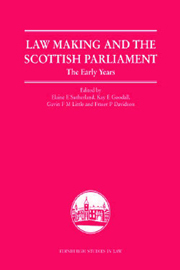Book contents
- Frontmatter
- Contents
- Preface
- List of Contributors
- Table of Cases
- Table of Westminster Statutes
- Table of Scottish Parliament Statutes
- Table of Westminster Statutory Instruments
- Table of Scottish Statutory Instruments
- THE SCOTTISH PARLIAMENT – ITS GENESIS AND OPERATION
- 1 Law Making and the Scottish Parliament: The Early Years in Context
- 2 A Parliament that is Different? The Law-Making Process in the Scottish Parliament
- RIGHTS AND SOCIETY
- PUBLIC ADMINISTRATION AND SERVICES
- JUSTICE AND LEGAL SYSTEM
- ECONOMY AND ENVIRONMENT
- Index
2 - A Parliament that is Different? The Law-Making Process in the Scottish Parliament
from THE SCOTTISH PARLIAMENT – ITS GENESIS AND OPERATION
Published online by Cambridge University Press: 05 September 2013
- Frontmatter
- Contents
- Preface
- List of Contributors
- Table of Cases
- Table of Westminster Statutes
- Table of Scottish Parliament Statutes
- Table of Westminster Statutory Instruments
- Table of Scottish Statutory Instruments
- THE SCOTTISH PARLIAMENT – ITS GENESIS AND OPERATION
- 1 Law Making and the Scottish Parliament: The Early Years in Context
- 2 A Parliament that is Different? The Law-Making Process in the Scottish Parliament
- RIGHTS AND SOCIETY
- PUBLIC ADMINISTRATION AND SERVICES
- JUSTICE AND LEGAL SYSTEM
- ECONOMY AND ENVIRONMENT
- Index
Summary
INTRODUCTION
Law making has emerged as one of the defining activities of the scottish Parliament. In the ten years since devolution the Parliament has passed almost 150 Acts, on subjects ranging from criminal law to evidence, from local government to planning, and from mental health to family law. In doing so it has confounded the expectations of those who thought that law making would not feature prominently among the new Parliament's activities:
so passionate were some of the expectations of devolution that some respectable voices argued that little or no devolved legislation would be needed. A nation that had voted decisively in favour of devolution would require precious little legislative governance.
Had it been suggested at the outset that in its first two sessions (1999-2007) the Parliament would pass no fewer than 128 Bills, the likelihood is that the suggestion would have been dismissed as absurd. In the third session the pace of law making has slowed, but the Parliament is still passing more Bills than the first Presiding Officer and others anticipated it would once the Westminster “backlog” of legislative business had been cleared.
In this chapter we concentrate not on the substance of the laws that have been made but rather on the process by which they have been made. We take a deliberately wide view of the legislative process, looking at what happens before a Bill is introduced, when the conventional wisdom asserts “all executive policy and most legislation is conceived, drafted and all but enacted”, as well as at what happens once it embarks on the parliamentary stages of the process.
- Type
- Chapter
- Information
- Law Making and the Scottish ParliamentThe Early Years, pp. 9 - 32Publisher: Edinburgh University PressPrint publication year: 2011



